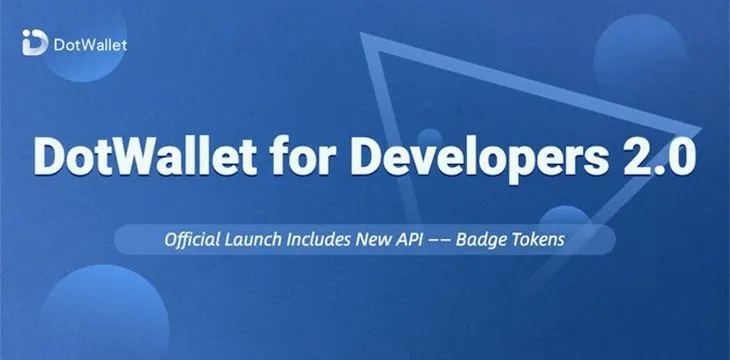|
Getting your Trinity Audio player ready...
|
DotWallet, the Bitcoin platform popular with Chinese BSV users, is launching version 2.0 of its developer platform. The “Bitcoin as a service” (BAAS) toolkit includes a new token solution named “Badge,” using technology co-developed with sCrypt.
Open Platform 2.0 for DotWallet also improves API services by implementing the new version of mAPI (1.2.0 beta), improves automatic multi-currency payments (instantly converting between BSV, BTC and ETH) and supports queries to retrieve a user’s automatic payment balance.
‘Badge’ allows simple token creation and management on BSV
Speaking to CoinGeek, the DotWallet team said it had over 900 developers using the current Open Platform, and about 30 development teams using its services. Though most popular in China, where it also has a WeChat app for BSV, DotWallet also has international English-language versions of its consumer wallet and developer tools, and a mobile app.
The “Badge” token creation platform enables easier token creation for BSV developers, with the rock-solid security provided by BSV’s blockchain. They said:
“This enables a variety of consumer use-case scenarios and enriches user experiences. It not only breaks the barriers between offline and online ecosystems, but enables all kinds of services in daily life. More importantly, it decreases the centralization and reliance on app providers. Users don’t have to worry about whether the company will shut down or pull an exit scam. They don’t have to worry about misappropriation, because all the information is recorded and traceable on the BSV chain.”
Full information and resources are available on DotWallet’s website here. More specifically, the Badge tokenization system works like this:
Token creation and issuance
Developers can create and issue tokens themselves, and set the rules for their use (e.g. validity period, or whether it’s publicly auditable). All the information and rules governing token functions are recorded on the BSV blockchain.
Token transfer
There is no need to rely on a central server to transfer tokens from one user to another, which DotWallet says avoids the risk of a single point of failure. Unlike traditional P2PKH, the token information is recorded in a UTXO script instead of an OP_RETURN script. This enables new business logic and makes sure the UTXO won’t be unintentionally spent. The token information will be synced into blocks, thus avoiding double spends and reorgs.
Token destruction and query
The tokens created can be transferred back to the issuer for recovery and destruction in a simple and efficient process. Additionally, any third-party program that supports the protocol can provide query functions (e.g. transaction history, balance, etc.). All records are public and auditable, which mirrors the UTXO transfer process on the blockchain.
DotWallet comes from Lin Zheming’s Fuzhou-based Boquan Hash Science and Technology Co. Ltd, and links to other apps and functions on various social media accounts including WeChat, Facebook and Google, as well as other BSV apps.
In April 2020, it introduced an automatic conversion system that allowed users to make/receive payments using tokenized BTC and ETH—even to non-BSV external addresses. As well as accommodating more users, this allowed those who still insist on using BTC and ETH to send payments while taking advantage of BSV’s far lower transaction fees.
Xiaohui Liu’s sCrypt was one of the first BSV smart contracts platforms, designed, in its founder’s words “to make developing smart contracts on BSV as easy as if you were writing Javascript code.”
See also: CoinGeek Live panel, Token Solutions on Bitcoin SV

 07-12-2025
07-12-2025 





